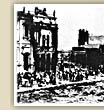
The Greeks' last days in Smyrna were passed in hellish agony and anxiety regarding their fate. Part of the Greek army reached
Smyrna in an orderly fashion, part inorderly. Aristeidis Stergiadis had abandoned the city on 25 August
in a British ship, while on that same day Smyrna's last civil
servants were evacuated, being the representatives of the Greek state.
The city was subjected to fire and the Greek and Armenian populations were put to the sword.
Unbelievable scenes unfolded on the waterfront of Smyrna, whither the crowds had thronged, pursued by the
irregular bands (tsetes) and fire in the hope of being saved. Among the victims was the metropolitan
Chrysostomos, who, refusing to forsake his flock, as recommended to him, was treated brutally and murdered by the fanatical Turkish mob.
Fire, slaughther and captivity was the fate of the Greeks in the peninsula
of Erythrea, in Kydonies and the area of Propontis. Men were deported to camps in the interior, as, in some cases, were women and children.
|
 |

With the debacle of the military campaign the immediate expulsion of the Greeks of Pontos was decided. The Pontine Greeks reached Constantinople, where they
were conveyed to Greece.
From eastern Thrace Greeks departed after the signing of the Mudania
armistice, from October 1922, following the Greek troops who were also in retreat.
Most of the Greeks of eastern Thrace were transported by ship, while others
used the road network of the Evros passages, carrying on pack animals and oxcarts
whatever chattels they could redeem. A few days later the Greeks of the
peninsula of Galipolli followed suit.
Lastly, with the exchange Treaty, signed on 30 January in Lausanne,
the last Greeks from all points of Asia Minor moved towards Greece.
Only the inhabitants of Constantinople and the islands of Imvros amd Tenedos
were excluded, as were the Muslims of western Thrace. The issue of reparations
for the properties of refugees remained pending.
|
 |
